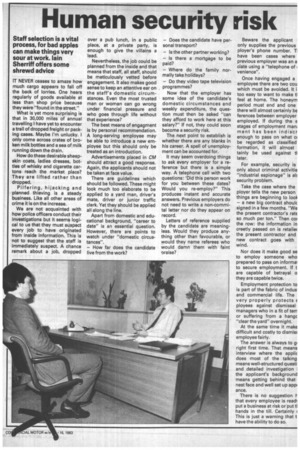Human security risk
Page 57

If you've noticed an error in this article please click here to report it so we can fix it.
Staff selection is a vital process, for bad apples can make things very sour at work. lain Sherriff offers some shrewd advice
IT NEVER ceases to amaze how much cargo appears to fall off the back of lorries. One hears regularly of goods available at less than shop price because they were "found in the street."
What is yet more surprising is that in 30,000 miles of annual travelling I have yet to encounter a trail of dropped freight or packing cases. Maybe I'm unlucky. I only come across crates of broken milk bottles and a sea of milk running down the drain.
How do these desirable sheepskin coats, ladies dresses, bottles of whisky and cigarette cartons reach the market place? They are lifted rather than dropped.
Pilfering, hijacking and planned thieving is a steady business. Like all other areas of crime it is on the increase.
We are not acquainted with how police officers conduct their investigations but it seems logical to us that they must suspect every job to have originated from inside information. This is not to suggest that the staff is immediately suspect. A chance remark about a job, dropped over a pub lunch, in a public place, at a private party, is enough to give the villains a lead.
Nevertheless, the job could be planned from the inside and that means that staff, all staff, should be meticulously vetted before engagement. It also makes good sense to keep an attentive ear on the staff's domestic circumstances. Even the most trusted man or woman can go wrong under financial pressure and who goes through life without that experience?
The best means of engagment is by personal recommendation. A long-serving employee may be able to introduce a new employee but this should only be treated as an introduction.
Advertisements placed in CM should attract a good response. Again, the applicants should not be taken at face value.
There are guidelines which should be followed. These might look much too elaborate to be applied to a yard man, driver's mate, driver or junior traffic clerk. Yet they should be applied all along the line.
Apart from domestic and educational background, "career to date" is an essential question. However, there are points to watch under "domestic circustances".
— How far does the candidate live from the work? — Does the candidate have personal transport?
— Is the other partner working?
— is there a mortgage to be paid?
— Where do the family normally take holidays?
— Do they video tape television programmes?
Now that the employer has some idea of the candidate's domestic circumstances and weekly expenditure, the question must then be asked "can they afford to work here at this salary?" If not, they could soon become a security risk.
The next point to establish is whether there are any blanks in his career. A spell of unemployment can be accounted for.
It may seem overdoing things to ask every employer for a reference but there is a simple way. A telephone call with two questions: 'Did this person work for you between these dates? Would you re-employ?" This produces instant and accurate answers. Previous employers do not need to write a non-commital letter nor do they appear on record.
Letters of reference supplied by the candidate are meaningless. Would they produce anything other than favourable, or would they name referees who would damn them with faint praise? Beware the applicant only supplies the previous ployer's phone number. TI have been cases where previous employer was an a ciate using a "telephone of I venience".
Once having engaged a employee there are two cou which must be avoided. It i too easy to want to make tl feel at home. The honeym period must end and one there will almost certainly be ferences between employer employed. If during the e stages of employment mani ment has been indiscr enough to pass on what cc be regarded as classified formation, it will almost tainly be used against tl later.
For example, security is only about criminal activitie "industrial espionage" is al; security problem.
Take the case where the ployer tells the new person things are beginning to look — a new big contract shoulc signed in a few months. "We the present contractor's rate so much per ton." Then cot the row: the information in creetly passed on is retailec the present contractor and new contract goes with wind.
Nor does it make good se to employ someone who prepared to pass on informal to secure employment. If t are capable of betrayal o they are capable twice.
Employment protection to is part of the fabric of indus and commercial life. The very properly protects E ployees against dismissal managers who in a fit of terr or suffering from a hangc "clear the yard" overnight.
At the same time it make difficult and costly to dismis; employee fairly.
The answer is always to gi right first time. That means interview where the applic does most of the talking means well-structured questi and detailed investigation i the applicant's background means getting behind that nest face and well set up appi ance.
There is no suggestion h that every employee is readN put a business at risk or put tl hands in the till. Certainly This is just a warning that t have the ability to do so.
























































































